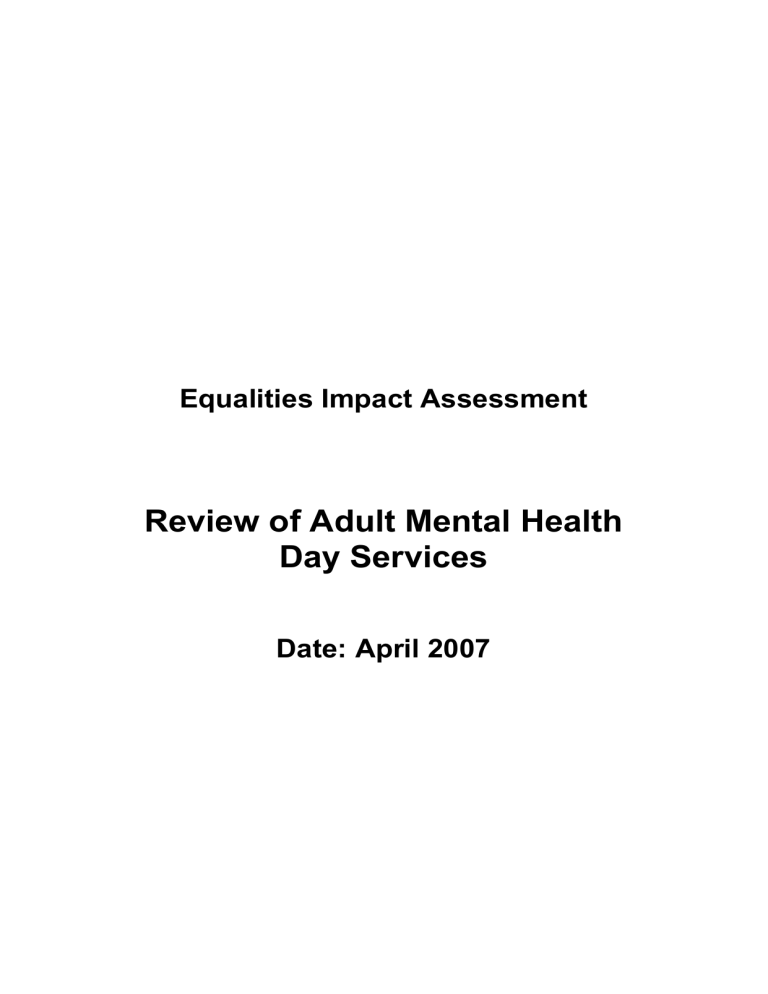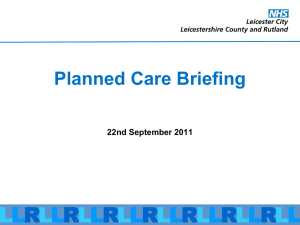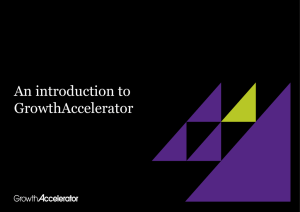Review of Adult Mental Health Day Services Equality Impact

Equalities Impact Assessment
Review of Adult Mental Health
Day Services
Date: April 2007
Record of Equality Impact Assessment
1. Department/Service Area
Adult Social Care
Mental Health Services
2. Equality Areas Assessed
Which of the following equality areas are being assessed: race, disability, gender, sexual orientation, religion/faith, age?
3. Timescale of the assessment
Review of Adult Mental Health Day Services
Race, disability, gender, faith, age, sexual orientation a) What is the start date? b) What is the finish date?
March 2007
April 2007
1. Who is involved in the EIA? (There should be a minimum of at least 3 officers)
– Project Managers
– Planning Officer Adult Mental Health Services
– Project Worker
2. Policy, procedure, service assessed
The purpose of the review of mental health day services is to modernise and provide more appropriate services which better meet the needs of mental health service users. Its aim is to provide improved and more individually tailored services.
The review reflects the national agenda around social inclusion, and intends to incorporate person-centred and recovery-focused practices in order to enable people experiencing mental health difficulties to Recover, and have a meaningful life playing a full and active part in their communities.
The service is for working age adults (i.e. 18 – 64) living in Leicestershire and
Rutland who experience mental health difficulties.
Equality Impact Assessment for Review of Adult Mental Health Day Services
Page 2 of 11
April 2007
V5
6. Data Collection and consultation
Data collection:
A mapping exercise has been carried out to collect data on current mental health day services users and on staff working in those services. This includes information on gender and ethnic origin. However it should be noted that many of the voluntary sector projects included in the review were unable to supply the data requested, because of capacity issues.
Data has been supplied by Leicestershire Partnership NHS Trust on the numbers of people contacting primary and secondary mental health services.
Data from the national mental illness prevalence rates has been applied to the local population to give an indication of the potential number of people who may experience mental health problems.
Information has been taken from the Health Commission NHS Patient Survey
2006.
Information about the demographics of the Leicestershire and Rutland population has been sourced from LSORA (Leicestershire Online Research
Atlas, based on ONS Census 2001 projections).
Reference has also been made to Leicestershire County Council’s modernisation of day services for people with learning disabilities, and the
Leicestershire Citizens Juries outcomes.
No information relating to complaints about day services could be sourced.
No data about sexual orientation could be sourced. However, findings from the recently published document “Sexyouality Matters: A strategy for improving the lives of LGBT people in Leicestershire” have been included.
No information about people with multiple disabilities could be sourced (i.e. people who have a mental health problem and another disability).
Information about take-up of services offered is not routinely recorded by service providers – that is, whilst the numbers of people entering a service is recorded, the number of people offered the service is not.
Consultation:
The review started with a formal launch at a conference on 29 th April 2005 with representatives of all stakeholders present (service users, informal carers, commissioners and provider staff from statutory, and Voluntary Sector organisations).
Equality Impact Assessment for Review of Adult Mental Health Day Services
Page 3 of 11
April 2007
V5
A questionnaire was distributed through all service providers to service users, carers and staff to find out their views of current services and the types of services they required for the future. The questionnaire was also published on the mental health website, and copies distributed through libraries, leisure and community centres. Translated versions of the questionnaire were provided.
A series of open consultation events was held in public venues across
Leicester City, Leicestershire and Rutland. At three events interpreters were provided.
From the outcomes of consultation, a strategic direction document was prepared and distributed to providers for service users, carers and staff, and published on LAMPdirect (the local mental health website). The Strategic
Direction paper informed the development of a model for mental health day services with a stated aim of addressing identified needs in a flexible and person-centred way. A series of information events was held to provide
- support and explanation of the strategic direction and the new model for day services.
7 events in statutory day services bases, with invitations extended to all local service users and carers through contact with community mental
-
-
- health services
3 events for staff working in day services
1 event for managers of day services
1 event with interpreters present
The model has also been the subject of regular discussion at meetings of commissioning and planning groups including the Adult Mental Health
Counties Strategy Team w here feedback from the People’s Forum
(independent service user organisation) and the National Service Framework
(Mental Health) Standard 6 group (Carers) was received for communication to the Day Services Review Steering Group.
Regular newsletters have been published and distributed via mental health service providers and on the LAMP website. Translated and accessible versions of newsletters have been provided.
The Steering Group includes representation from all the key stakeholders involved in the review process.
7. Findings
In order to comply with the national vision for day services and the social inclusion agenda, and to meet the needs identified through the consultation process, local services need to change. This will affect all current users of mental health day services, as well as staff working in those services.
Equality Impact Assessment for Review of Adult Mental Health Day Services
Page 4 of 11
April 2007
V5
Location
The mapping exercise showed that services are not evenly distributed across the population centres of the counties.
There is little or no provision in most rural areas and access to transport is a key issue for people who do not live in the county towns.
Ethnicity
The South Leicestershire and Charnwood areas have significantly larger proportions of people from Black and Minority Ethnic communities than the remainder of the districts in Leicestershire and Rutland. There is currently some specialist provision in both South Leicestershire and Charnwood to address the specific Black and Minority Ethnic needs within mental health day services.
The largest disparity occurs in South Leicestershire, where 11.34% of people using statutory sector day services are from black and minority ethnic communities, compared with the general population profile of 16.52%.
However, evidence gathered in the review of learning disability day services indicated that people from South Leicestershire also use services based in
Leicester City, where black and minority ethnic population density rises and more dedicated services are based. It is possible that this has been reflected in mental health day services.
The Department of Health in the report Delivering Race Equality in Mental
Health Care , states that “service users from minority ethnic groups are underrepresented in all nonspecialist services”. Additionally,
Inside Outside , a
Government report from 2003, states that “ there does not appear to be a single area … in which black and minority ethnic groups fare as well as or better than the majority white community”.
The NHS report “Positive Steps – supporting race equality in mental healthcare” (DOH 2007) notes that “language is a key contributing factor to misdiagnosis”. And that “everyone should be able to access support from staff that are aware and sensitive to their cultural and religious needs … in an environment in which t hey feel able to relax”.
The new model allows for Black and Minority Ethnic specific support, through dedicated posts in the Social Inclusion Service and the possibility of providing
Black and Minority Ethnic specific social drop-ins.
Some posts within the new structure will be designated for staff from minority ethnic backgrounds in both statutory and voluntary sector projects. Isolation may be an issue for these staff, given that there may only be 1 or 2 in any given team or organisation.
Equality Impact Assessment for Review of Adult Mental Health Day Services
Page 5 of 11
April 2007
V5
Faith
In relation to faith, the Sikh and Muslim populations in the County are centred in South Leicestershire, particularly in the Oadby & Wigston area.
In Charnwood, the faith of the Black and Minority Ethnic population is predominantly Hindu, followed by Sikh.
Inside Outside states: “faith and spirituality can often help patients’ recovery, and play an important role in many communities’ mental health ”. A Mental
Health Foundation research programme suggested that there was a positive link between better mental health and practices such as attending mosque.
There may therefore be needs related to religion or faith which require specific provision.
Gender
The current users of mental health day services across the county of
Leicestershire are evenly split male/female.
In Rutland there is an imbalance, and only 12.5% of people using the Rutland
Mental Health Project are male. Although there are only small numbers of people using the Rutland service, there is a risk of isolation and of failing to meet gender-appropriate needs because of low perceived demand. The
National Service Framework (Mental Health) identified the need to address the particular different mental health needs of men and women, and the gender equality duty on public bodies reinforces this. ( Equal Opportunities
Commission )
In common with most areas of social care and health provision, there are more women than men working in mental health day services. The issue of safety for staff working alone in the community should pay attention to any risks specifically for female staff.
Age
Consultation and information sharing has been with the targeted users of this service which is provided for working age adults (i.e., people aged between
18 and 64).
Data from statutory day services shows that the proportion of people aged between 18 and 30 using them is only 12.3% of the total, across the county of
Leicestershire. This may in part be attributable to age differences in onset of mental health problems, together with services from the Early Intervention
Service for Psychosis which may defer engagement with day services.
However it is also possible that younger people may not engage with current day services provision because of a reluctance to engage with specialist services and a perception that services are geared to people over 40.
There is a clear need for good links with services for both younger and older people in order to ensure that there are no ‘gaps’ between services, and that there are smooth transitions between services.
Equality Impact Assessment for Review of Adult Mental Health Day Services
Page 6 of 11
April 2007
V5
Disability
Mental illness is a recognised disability, therefore all service users can be deemed to have a disability. The stigma and prejudice attached to mental health problems can create barriers the social inclusion agenda aims to challenge and address this.
Whilst there is no available data around multiple disability, when sourcing new venues for day services it is important to be mindful of accessibility issues.
Good links need to be made with specialist services for people with physical and sensory im pairment, and to the “Green Light” work for people with learning disabilities.
The Healthcare Commission NHS Patient Survey 2006 published the following results:
“Only 29% of respondents were in paid employment, and a further 3% were involved in voluntary activity or casual work. Over half of the people interested in finding work said they had received no help to do so. 45% of all respondents said they could not work because of their mental health problems” (Healthcare Commission NHS Patient Survey 2006).
Sexual Orientation
'Sexyouality Matters - A strategy for improving the lives of LGBT people in
Leicestershire' refers to high levels of depression, anxiety and thoughts of self-harm amongst lesbian, gay men and bisexual people in Leicester and
Leicestershire.
7. Conclusions
The current percentage of people using local community day services varies between 25% and 50% of the total number of people who have engaged with secondary mental health care services. The majority of this support is provided through groups and the aim of broadening service provision would be to meet the needs of people who do not wish to take part in group activities.
The change to provision of services in local communities should make them more accessible to people who have not previously used them. For people in rural communities, transport issues may be a barrier to accessing services.
This may require a review of current transport provision policy or in some cases transport could be resourced through the use of Direct Payments.
The Social Inclusion Service and Inclusion Development Workers will be charged with addressing access to employment and volunteering.
The modernisation of mental health day services should have positive benefits for all current and future users of those services, including those currently under-represented in use of day services, through the adoption of person centred planning and social inclusion approaches.
Equality Impact Assessment for Review of Adult Mental Health Day Services
Page 7 of 11
April 2007
V5
There are issues around the need for specialist provision for people from
Black and Minority Ethnic communities which the proposed model aims to address. The level of demand for services for people from Black and Minority
Ethnic communities is not currently well understood, and further work to explore this is required. Such work will need to take account of any changing demographic trends. It is also unclear whether current services are seen by
Black and Minority Ethnic communities to meet their needs and further work to determine how best to do so is also required.
The level of need for gender-specific services has not been clearly determined.
Further work needs to be undertaken regarding the recommendations from the 'Sexyouality Matters - A strategy for improving the lives of LGBT people in
Leicestershire’ Work should include discussion with the Lesbian, Gay and
Bisexual Centre.
Good links need to be made across geographical boundaries with faith communities in order to address any specific needs identified through person centred planning.
The proposed frequency of provision fits with the outcomes of the Health
Commission survey usage.
It will be essential to monitor service usage and hold regular reviews, and for all service providers to gather good data about the people they are working with.
In all instances, services will need to be flexible and responsive to the outcomes of monitoring exercises and future reviews and consultation.
8. Actions
Implementation of the modernisation process includes a requirement for all new services to use person centred approaches and ways of working which will identify and address individual unique needs, including any issues relating to culture (ethnicity, race and language), age, gender, sexual orientation, faith and disability.
There will need to be strong links and liaison between staff in drop-in groups and inclusion support services, Inclusion Development Workers and the Black and Minority Ethnic Community Development Workers and mental health teams and primary care services.
Commissioners need to clarify monitoring frameworks and recording requirements which should be consistent for all projects.
Engagement with local communities is a key feature of the new model. This needs to include generic community services as well as specific groups, for example gender-specific groups and faith communities. Work must include
Equality Impact Assessment for Review of Adult Mental Health Day Services
Page 8 of 11
April 2007
V5
consultation with Black and Minority Ethnic communities to determine the most suitable ways to ensure engagement and meet needs.
Work should include discussions with the Lesbian, Gay and Bisexual Centre about the recommendations from “Sexyouality Matters”.
The Strategic Health Authority has identified a requirement for a local strategic needs assessment in order to have better information and understanding of the people who need services. If this work is carried out, better demographic and needs information will be gathered and should be used to inform the development of the services.
The provision of good quality and timely information is key to ensuring that people can access services appropriately. Information needs to be displayed in public and community venues as well as specialist mental health service buildings. Availability of information in languages and formats other than spoken and written English must be addressed.
10. Monitoring
It is proposed that all services, including statutory services, will have formal service agreements. These should include requirements for recording and monitoring of equality data and issues, a requirement to carry out an annual satisfaction survey and reporting of the outcomes of that.
There needs to be ongoing and regular consultation with service users and carers, including involvement of service user and carer organisations in evaluation of services.
11. Authorisation a) Name and position of officer authorising the EIA (this should be the head of service)
12. Contact a) Contact details of officer to discuss EIA with if different from section 11. above
Equality Impact Assessment for Review of Adult Mental Health Day Services
Page 9 of 11
April 2007
V5
Demographic Information - Leicestershire and Rutland Counties
Ethnicity
Total population
White
Mixed race
Asian
Black
Other
Working age population
Total population BME numbers
Total population BME%
Leics County
616610
577622
4539
22495
1954
3226
309100
32214
5.22%
Blaby
91600
85113
831
3411
452
445
Oadby &
Wigston
54100
46857
606
7431
502
399
Hinckley &
Bosworth
100141
98058
590
1051
120
310
Charnwood
157500
140674
1374
9207
615
1592
North West
Leics
85503
84728
420
351
79
195
56400 33800
5139 8938
5.61% 16.52%
63500
2071
2.07%
101100
12788
8.12%
54300
1045
1.22%
Melton
47866
47271
226
246
39
84
29600
595
1.24%
Harborough
79900
74921
492
798
147
201
48600
1638
2.05%
Rutland
43563
33922
255
138
107
141
25277
641
1.47%
Faith (% of population)
Christian
Hindu
Muslim
Sikh
Buddhist
Jewish
73.67
1.87
0.41
1.42
0.13
0.08
64.00
6.00
2.78
4.16
0.16
0.30
78.00
0.50
0.30
0.20
0.10
0.01
69.55
3.98
1.57
0.52
0.23
0.10
78.17
0.20
0.13
0.09
0.10
0.05
79.21
0.20
0.13
0.09
0.10
0.05
77.98
0.47
0.23
0.30
0.14
0.13
79.82
0.31
0.23
0.14
Contact with Mental Health Services
The information recorded by Leicestershire Partnership Trust has been collated geographically by the former Primary Care Trust areas, some of which covered more than one district council area in Leicestershire. South Leicestershire equates to approximately the areas of Blaby, Oadby & Wigston plus some parts of both Harborough and Hinckley & Bosworth District Council areas. The figures show the percentage of the whole population that has had contact with mental health services.
Population by PCT area
Primary Care
Secondary Care
South Leics PCT
708210
0.86%
1.30%
Hinckley &
Bosworth
100141
0.99%
0.93%
Charnwood and North West
Leics PCT
243003
0.69%
0.95%
Melton Rutland and Harborough PCT
171329
0.42%
1.19%
Extrapolated numbers
Primary Care
Secondary care
9478
14485
6091
9207
Equality Impact Assessment for Review of Adult Mental Health Day Services
991 1677 720
Page 10 of 11
931 2309 2039 April 2007
V5
The World Health Organisation estimate that 2-3% of general populations will have a severe mental health problem, and the Sainsbury's Centre for Mental Health suggests figures of 2-4%. This gives a figure of around 9,000-18,000 in Leicestershire with severe mental health problems, which matches the total secondary care contact figure of 14,485 supplied by Leicestershire
Partnership NHS Trust.
Use of day services/Ethnicity
Statutory sector
White
Mixed race
Asian
Black
Other
Not recorded
Total
Voluntary sector
White
Mixed race
Asian
Black
Other
Totals
Leics County
South Leics
Hinckley &
Bosworth
Charnwood
North West
Leics
Melton Harborough Rutland
537
4
22
1
1
22
587
245
1
84
0
1
331
Total numbers
470
145
1
10
0
0
4
160
114
0
1
0
0
3
118
99
2
8
0
1
2
112
89
0
0
0
0
7
96
28
0
0
0
0
4
32
40
0
3
0
0
2
45
The total number of service users in voluntary sector projects has been calculated at 470
(December 2006 figures), however not all projects have been able to supply detailed information broken down by ethnic origin and gender. It should be further noted that service users may use both statutory and voluntary sector services and will therefore have been counted within both sectors' numbers.
22
1
0
1
0
0
24
Source: Self reported use of services data supplied to Day Services Review November 2005. Note: there is no voluntary sector provision in Rutland
Information on voluntary sector service user numbers has been taken from the service mapping carried out by NDT in February 2005 (updated in November 2005) and reporting from reviews of voluntary sector projects up to December 2006.
Use of statutory day services/age
Age 18-30
Age 31-50
Age 50-65
Age over 65
Totals
Percentages by age:
Age 18-30
Age 31-50
Age 51-65
Age over 65
Leics County
70
242
208
49
569
12.30%
42.53%
36.56%
8.61%
South Leics
35
71
49
13
168
Hinckley &
Bosworth
15
40
51
11
117
Charnwood
8
55
40
8
111
North West
Leics
5
42
38
11
96
Melton
2
17
12
1
32
Harborough
5
17
18
5
45
20.83%
42.26%
29.17%
7.74%
12.82%
34.19%
43.59%
9.40%
7.21%
49.55%
36.04%
7.21%
5.21% 6.25%
43.75% 53.13%
39.58% 37.50%
11.46% 3.13%
11.11%
37.78%
40.00%
11.11%
Use of day services/gender
Statutory sector
Male
Female
Leics County
218
242
Voluntary sector
Male
Female
114
137
Numbers of people using secondary mental health services who are eligible to engage with day services 1921
South Leics
45
52
Hinckley &
Bosworth
Charnwood
North West
Leics
35
54
50
54
48
33
Melton
19
20
Harborough
21
29
Rutland
3
21
587-1057
Totals of people on both statutory and voluntary sector registers. Service users may use both sectors' services and be counted in both
Number of people currently using day services
Current percentage of eligible people using day services 30-55%
Equality Impact Assessment for Review of Adult Mental Health Day Services
Page 11 of 11
April 2007
V5





